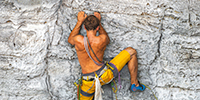An investigation of pathogens on rock climbing mat materials

The International Federation of Sport Climbing reports that 44.5 million individuals rock climb regularly and that this community is growing as a result of rock climbing's debut in the upcoming 2020 Olympics. Increasing anecdotal evidence demonstrates that small cuts and abrasions may become infected upon exposure to different materials commonly found in rock climbing gyms, such as climbing holds, mats, and padding. We therefore seek funding to perform pathogen testing at the Student Life Center’s Summit Climbing Gym and local industry gyms (Momentum and The Front).
This proposal brings together researchers with varying expertise from the College of Engineering (Profs. Taylor Sparks and Ramesh Goel), Marriott Library (Assistant Librarian Tallie Casucci), and School of Medicine (Senior Research Scientist Abby Pulsipher). We established this Team based on a shared interest in rock climbing and its affect on public health at the UofU.
A variety of gym mat and padding materials will be swabbed and subjected to microbial sequencing, aiding in the discovery of which materials may be pathogen-resistant and remediation methods to mitigate infections from these surfaces, as well as the design of new pathogen-resistant materials. Ultimately, this project will develop and transfer new knowledge about pathogens and rock climbing surfaces, improving the health of climbers and other athletes at the UofU and beyond.
Current Status
2021-09-13
ABSTRACT: The International Federation of Sport Climbing reports that 44.5 million individuals rock climb regularly and that this community is growing. Prior studies have reported the presence of pathogens on surfaces in non-climbing gym and fitness facilities, and increasing anecdotal evidence demonstrates that small cuts may become infected upon exposure to different materials commonly found in rock climbing gyms. The global coronavirus pandemic forced indoor climbing gyms to close during lock-down periods (Spring 2020), and public health questions concerning SARS-CoV-2 transmission emerged. Climbing gyms adopted new sanitation, physical distancing, and masking protocols once reopened. With the enforcement of these safety measures, we hypothesized that SARS-CoV-2 would be detected, but not on all surface types, in climbing gyms. Identifying which high-contacted climbing gym-specific surface would enable staff to alter transmission mitigation strategies. Multiple high-contacted rock climbing gym surfaces, including climbing mats/padding, holds, ropes, belaying equipment, bathroom surfaces, and ventilation ducts, were sampled via swab collection and subjected to polymerase chain reaction-based detection of SARS-CoV-2 and 21 other viral and bacterial pathogens commonly associated with respiratory infections. Of the 22 respiratory pathogens assessed, none were measured within the limit of detection, potentially suggesting that the newly enforced transmission mitigation protocols were successful.
Collaborators
Tallie Casucci
Marriott Library
Marriott Library
Project Owner
Abigail Pulsipher
School of Medicine
Otolaryngology Division
Taylor Sparks
College of Engineering
Material Science and Eng
Project Info
Funded Project Amount$15K
Keywords
pathogens, infections, materials science, exercise equipment, climbing mats, rock climbing, antibiotic resistance
Project Status
Funded 2020
Poster
View poster (pdf)
